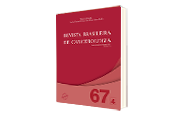Nutritional Profile, Fatigue and Appetite of Patients with Cancer at Hospital Santo Antônio, Blumenau - SC
DOI:
https://doi.org/10.32635/2176-9745.RBC.2021v67n4.1375Keywords:
Nutritional Status, Neoplasms/drug therapy, Fatigue, AppetiteAbstract
Introduction: Cancer is a chronic, multifactorial disease, and a major public health problem. Nutrition plays a key role both in prevention and treatment of this disease. Simultaneously, the patient commonly complains of fatigue and lack of appetite, which can change its nutritional status. Objective: To evaluate the nutritional profile, fatigue, and appetite of patients with cancer in chemotherapy at Hospital Santo Antonio. Method: Cross-sectional and observational study with convenience non-probabilistic sample. The patients with cancer were interviewed during chemotherapy treatment, through semi-structured questionnaire addressing sociodemographic and health data, 24-hour dietary recall survey, European Organization for Research and Treatment of Cancer – Quality of Life Questionnaire Core 13 and Cancer Appetite and Symptom Questionnaire. Results: The sample consisted of 100 patients, with higher incidence of breast cancer (n=36), followed by colorectal (n=16) and lung (n=11). Besides, overweight (n=22) and obesity (n=28) were found, and 82 participants reported more frequent symptoms of nausea and diarrhea in the gastrointestinal tract. There was insufficient intake of energetic food, carbohydrates and fibers and beyond the recommended for lipids, vitamins C and selenium. According to the appetite scale, the mean was 2.05 (±0.77) and in the fatigue scale, the mean was 28.76 (±8.35). Appetite was related to fatigue. Conclusion: The study demonstrated that the majority of cancer patients undergoing chemotherapy were overweight and obese, with insufficient energetic intake and hyperlipidic diet. The reduction of the appetite interfered with food intake, and it is related to the aggravation of fatigue.









